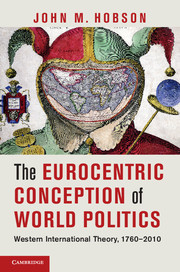Book contents
- Frontmatter
- Contents
- Figures
- Tables
- Acknowledgments
- 1 Introduction
- Part I 1760–1914
- Part II 1914–1945 The high tide of manifest Eurocentrism and the climax of scientific racism
- Part III 1945–1989 Subliminal Eurocentrism in international theory
- Part IV 1989–2010 Back to the future of manifest ‘Eurocentrism’ in mainstream international theory
- Part V Conclusion Mapping the promiscuous architecture of Eurocentrism in international theory, 1760–2010
- References
- Index
1 - Introduction
constructing Eurocentrism and international theory as Eurocentric construct
Published online by Cambridge University Press: 05 June 2012
- Frontmatter
- Contents
- Figures
- Tables
- Acknowledgments
- 1 Introduction
- Part I 1760–1914
- Part II 1914–1945 The high tide of manifest Eurocentrism and the climax of scientific racism
- Part III 1945–1989 Subliminal Eurocentrism in international theory
- Part IV 1989–2010 Back to the future of manifest ‘Eurocentrism’ in mainstream international theory
- Part V Conclusion Mapping the promiscuous architecture of Eurocentrism in international theory, 1760–2010
- References
- Index
Summary
Introduction: international theory as defender of Western civilization
This book produces a twin-revisionist narrative of Eurocentrism and international theory. While the first narrative provides an alternative understanding of Eurocentrism/Orientalism to the reductive conception that was bequeathed by the late, pioneering Edward Said (1978/2003), the second argues that international theory, which has developed both inside and outside of the discipline of International Relations in the last quarter-millennium is, for the most part, a Eurocentric construct. Or to put it more accurately, international theory largely constructs a series of Eurocentric conceptions of world politics. I state this in the plural because I argue that Eurocentrism is a polymorphous, multivalent discourse that crystallizes in a variety of forms. And this leads on to one of my central claims: that international theory does not so much explain international politics in an objective, positivist and universalist manner but seeks, rather, to parochially celebrate and defend or promote the West as the proactive subject of, and as the highest or ideal normative referent in, world politics.
Of course, my reader will assume immediately that in portraying much of international theory as Eurocentric so I will necessarily (re)view it in an imperialist light. But one of the major claims I make in this book is that ‘Eurocentrism’ not only takes different forms, but that some of these are anti-imperialist while others are imperialist. Such a move, of course, problematizes in an immediate way Said’s inherently imperialist definition of Eurocentrism/Orientalism. Of course, I realize that breaking the Gordian Knot between Eurocentrism and imperialism would most likely be viewed within postcolonial circles as a heretical move. But, as I shall argue in this book, an anti-imperialist politics is often as politically fraught as is its so-called imperialist ‘Other’. For my claim is that the conventional binary that differentiates a Eurocentric or racist conception of imperialism from a tolerant cultural-pluralist conception of anti-imperialism often turns out to be more imaginary than real.
- Type
- Chapter
- Information
- The Eurocentric Conception of World PoliticsWestern International Theory, 1760–2010, pp. 1 - 30Publisher: Cambridge University PressPrint publication year: 2012



